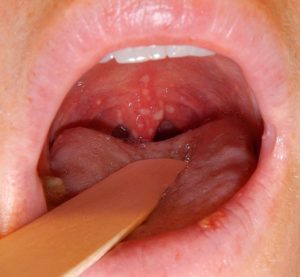Having a baby at home means you will need to visit the doctor many times. Not that this is necessarily a bad thing, but such a fragile life at the very beginning is certainly going to need a lot of care. Because their immune system is still developing, a baby is much more prone to getting sick and is much more vulnerable to viruses and bacteria. Herpangina1 is one of these diseases, extremely common among children aged 3 to 10 years, although it can affect people of any age. Want to know what it is, what causes it, its main symptoms, and how to treat this disease? That is exactly what today’s article will discuss.
What is Herpangina?
It is a highly contagious disease that mostly affects children up to 5 years old, but it can also affect older children and even adults. Usually caused by the Coxsackie virus2, herpangina is more common during the warmer months of the year, especially in summer. It is a mild illness that can be cured in a few days, although in rare cases it can become complicated, causing serious problems in the nervous system or even death. However, these extreme cases are rare exceptions and should not be taken as the norm, even though it is important to treat the disease even when it seems mild.
Main Symptoms of Herpangina
The first signs of the disease are very similar to those of a common flu, with symptoms like high fever and sore throat. Some other symptoms that may appear at the early stage include vomiting, diarrhea, swollen gums, and excessive saliva production. The fever usually lasts about 4 days. After this period, small red spots usually appear at the back of the mouth, which may lead to canker sores and even ulcers in more severe cases. These lesions can also appear on the hands and feet of the infected person. Due to the very high fever and strong sore throat, it can happen that the child refuses to eat, which can make treatment a little more difficult. It’s important that, if this happens to your child, you seek a pediatrician as soon as possible so they don’t suffer from a lack of nutrients during the period when they are sick. 
How is the Disease Diagnosed?
The diagnosis of herpangina is made by observing the symptoms by a doctor. Based on the characteristic sores in the mouth, they can say if the child is infected or not, but in some cases, the doctor may also isolate the virus and order some lab tests to confirm if it is really herpangina. However, these tests are not very common, since the time to get results is usually longer than the duration of the disease itself.
How is Herpangina Treated?
Herpangina is a disease that goes away on its own and its course lasts, on average, 10 days. The treatment is aimed at relieving symptoms such as fever and the pain the child feels3. For this, a doctor can prescribe fever reducers and antibiotics, and may also prescribe anesthetics, depending on the case. It is also recommended to keep the child hydrated at all times, mainly due to loss of fluids from diarrhea and vomiting, and also because many children have difficulty eating and drinking. The disease usually disappears gradually as the symptoms also go away. If it persists after this period, it is important to seek a doctor to check for possible complications.
Prevention Methods
There is no vaccine or medication that prevents herpangina, so prevention should be done by avoiding contagion. Firstly, take care with your hygiene habits when dealing with the child and also the child’s habits, always washing hands before and after eating and going to the bathroom. Secondly, it is important to keep the child away from places where there have been cases of the disease to avoid contact with the virus. These are simple steps, but can be very effective in preventing herpangina. Diseases like herpangina end up affecting several children because it is a virus that spreads quickly. And although it causes concern in many mothers, it is a relatively simple illness and can also be simply cured if the proper care is taken. Things like this are part of every mother’s routine and, as frightening as it may seem, it will eventually become part of yours too. This does not mean it is something bad or that you are doing something wrong, it just means that the cycle of life is taking its natural course. They are things we learn over time, and once we go through them, we become more experienced, and the children become stronger.











